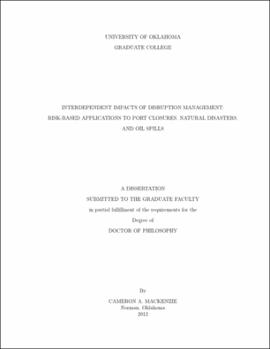| dc.contributor.advisor | Barker, Kash | |
| dc.creator | MacKenzie, Cameron Alexander | |
| dc.date.accessioned | 2019-04-27T21:24:09Z | |
| dc.date.available | 2019-04-27T21:24:09Z | |
| dc.date.issued | 2012 | |
| dc.identifier | 99157362602042 | |
| dc.identifier.uri | https://hdl.handle.net/11244/318597 | |
| dc.description.abstract | Recent disasters such as Hurricane Katrina, the Deepwater Horizon oil spill, and the 2011 earthquake and tsunami in Japan disabled production facilities, created supply shortages, disrupted business operations, and altered consumer behavior. Disruptions in one geographic area can disrupt supply chains and production on a local, regional, or global scale. Accurate models of the interdependencies between industries, countries, and regions are crucial in order to analyze and quantify the economic impacts | |
| dc.description.abstract | of a disruption. | |
| dc.description.abstract | This dissertation provides multiregional input-output models and real-world simulations to analyze the direct and indirect economic impacts of disruptions on industries, countries, and regions. This research quantifies the impact of industry and government mitigation strategies, such as keeping inventory, buying from alternate suppliers, using alternate modes of transportation, and allocating resources to help industries recover from a disruption. The models incorporate industry decision making to maintain production in response to a disruption, and the optimal alternative is solved as a function of model parameters. Because of these models' complexities, simulations are constructed in which firms and suppliers act as entities that make decisions to achieve their own objectives. By modeling mitigation strategies, business decision making, and consumer behavior, this research provides a realistic and unique analysis of the economic impacts of recent disasters. | |
| dc.description.abstract | Each chapter in this dissertation applies these models and simulations to real-world applications that rely on publicly available data and media stories to estimate parameters. Case studies include the sudden closure of an inland waterway port, the macroeconomic impacts of the Japanese earthquake and tsunami, the disruption in the automobile sector caused by the Japanese disaster, and the Deepwater Horizon oil spill. The numerical results and models presented in this dissertation provide new information and insights to aid policymakers and business leaders to make sound decisions to reduce economic losses caused by future disruptions. | |
| dc.format.extent | 191 pages | |
| dc.format.medium | application.pdf | |
| dc.language | en_US | |
| dc.relation.requires | Adobe Acrobat Reader | |
| dc.subject | Risk management | |
| dc.subject | Emergency management--Finance | |
| dc.subject | Disasters--Costs | |
| dc.subject | Delivery of goods--Management | |
| dc.subject | Oil spills--Economic aspects | |
| dc.title | Interdependent Impacts of Disruption Management Strategies: Risk-Based Applications to Port Closures, Natural Disasters, and Oil Spills | |
| dc.type | text | |
| dc.type | document | |
| dc.thesis.degree | Ph.D. | |
| ou.group | College of Engineering::School of Industrial Engineering | |
